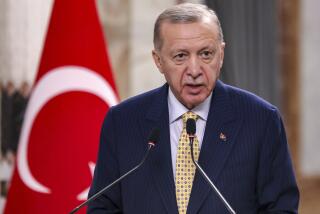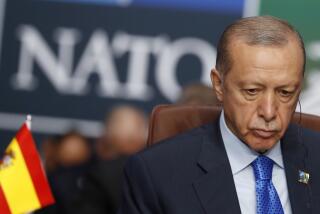Turkey Makes Gains in EU Bid
- Share via
ANKARA, Turkey — Turkey’s bid to become the European Union’s first predominantly Muslim member received a significant boost Wednesday when the EU’s executive commission officially recommended that the 25-member bloc start talks with Ankara.
In a landmark report assessing Turkey’s progress toward fulfilling its membership criteria, the European Commission indicated, however, that the country could not join its club for at least a decade. It also put off the EU members’ decision on whether to hold talks until their last summit of the year in December.
“The commission’s answer is yes.... It is a conditional yes,” commission President Romano Prodi told the European Parliament during a stormy session in Brussels.
Some of those conditions did not augur well for Turkey’s prospects of joining the union any time soon. Prodi warned that the outcome of negotiations “is not a foregone conclusion” and called for more efforts to stop torture, promote women’s rights, protect religious freedom and keep the Turkish army out of politics.
Moreover, one condition suggested by the commission was indefinite curbs on labor migration by Turks into EU countries. And another would allow the EU to suspend talks with Turkey if Ankara backtracked on implementation of democratic and human-rights reforms that it had enacted to meet EU standards.
This is the first time the EU has, in writing, called on a candidate country to meet such requirements.
Nevertheless, Turkey’s prime minister, Recep Tayyip Erdogan, struck a confident note at a news conference in Strasbourg, France, saying he fully expected EU leaders to act on the executive commission’s recommendation. He rejected the notion that new conditions had been attached to Turkey’s membership.
“Turkey has fulfilled all its obligations,” Erdogan said, and “expects a positive result.”
Erdogan argued that denying Turkey entry would prove that the EU was a Christian club rather than a union of shared principles and values, and that it would send a negative message to the Muslim world. “If you are declaring that you are a Christian club, then do so now,” he said.
In Ankara, Foreign Minister Abdullah Gul termed the commission’s recommendation “a historic step for Turkey and for the EU.”
But outside the German Embassy here, the mood of hundreds of Turks waiting in line for visas was less upbeat. “I’ve been waiting for over a week now,” said Tacettin Ozkan, a middle-aged farmer camping on a mattress. “They [the Europeans] see us as subhumans. They will never let us in.”
Turkey, a predominantly Muslim nation of 70 million people that is officially secular, has long sought to join the EU. But the EU, citing human rights abuses, has held Turkey at bay.
A blizzard of reforms adopted by the group of politically tolerant Islamists who took power in Ankara nearly two years ago has helped erode EU resistance. In the last year, the country’s 12 million Kurds have been permitted to broadcast in their long-banned language for the first time. Also, Christians can now open their own churches, albeit after completing a number of bureaucratic steps.
“Turkey has undergone remarkable changes over the last few years, putting in place the extensive reforms the EU asked of it,” British Foreign Minister Jack Straw said in a statement. “The EU must now deliver its side of the bargain.”
The Bush administration also backs Turkey’s bid, hoping that membership will help lock in a strategic ally.
But resistance to accepting a large, poor and Muslim nation has been building, particularly in France, Austria, Holland, Belgium and Hungary. Many Europeans see Turkey as culturally incompatible.
French President Jacques Chirac recently said that Turkey’s membership should be put to a referendum.
More to Read
Sign up for Essential California
The most important California stories and recommendations in your inbox every morning.
You may occasionally receive promotional content from the Los Angeles Times.













